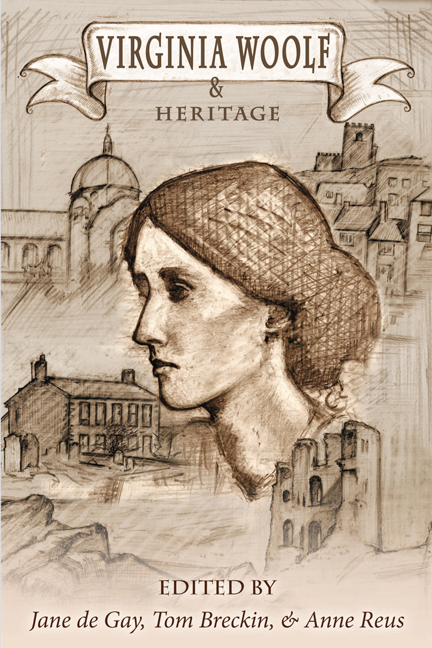Book contents
- Frontmatter
- Contents
- Introduction
- List of Abbreviations
- HERITAGE: A DEBATE
- HERITAGE, EDUCATION, AND MENTORING
- HERITAGE SPACES
- LITERARY AND CULTURAL HERITAGES
- QUEER PASTS
- MODERNISM AND HERITAGE
- Resetting the Type: An Exploration of the Historical Sense in Mrs. Dalloway
- Kenya Colony and the Kenya Novel: The East African Heritage of “A Very Fine Negress” in A Room of One's Own
- Leonard Woolf 's Fear and Politics: A Debate at the Zoo: Satirical Heritage as Apocalyptic Prophecy
- Virginia Woolf and the War on Books: Cultural Heritage and Dis-Heritage in the 1930s
- Gender Roles and the War Machine: An Undergraduate Roundtable on Virginia Woolf 's Legacies
- WRITING LIVES AND HISTORIES
- WOOLF'S LEGACIES
- FINALE
- Notes on Contributors
Leonard Woolf 's Fear and Politics: A Debate at the Zoo: Satirical Heritage as Apocalyptic Prophecy
from MODERNISM AND HERITAGE
- Frontmatter
- Contents
- Introduction
- List of Abbreviations
- HERITAGE: A DEBATE
- HERITAGE, EDUCATION, AND MENTORING
- HERITAGE SPACES
- LITERARY AND CULTURAL HERITAGES
- QUEER PASTS
- MODERNISM AND HERITAGE
- Resetting the Type: An Exploration of the Historical Sense in Mrs. Dalloway
- Kenya Colony and the Kenya Novel: The East African Heritage of “A Very Fine Negress” in A Room of One's Own
- Leonard Woolf 's Fear and Politics: A Debate at the Zoo: Satirical Heritage as Apocalyptic Prophecy
- Virginia Woolf and the War on Books: Cultural Heritage and Dis-Heritage in the 1930s
- Gender Roles and the War Machine: An Undergraduate Roundtable on Virginia Woolf 's Legacies
- WRITING LIVES AND HISTORIES
- WOOLF'S LEGACIES
- FINALE
- Notes on Contributors
Summary
Leonard Woolf's 24-page satirical pamphlet, Fear and Politics: A Debate at the Zoo, number 7 in the first series of Hogarth Essays, was first published in 1925. The essay itself takes up only 20 pages of the small pamphlet and is approximately 7000 words long. In 1973, this pamphlet was bound into a single volume titled In Savage Times: Leonard Woolf on Peace and War along with three others (The Way of Peace [1928], The League and Abyssinia [1936], and The International Post-War Settlement [1944]) and published by Garland with an introduction by Stephen J. Stearns.
Stearns begins the introduction by stating that, “Leonard Woolf was fascinated with zoos.…Nevertheless, as he wrote in his biography,…he was ambivalent about his attraction.…He thought it horrible to lock animals up and deprive them of their precious freedom; yet he delighted in watching them” (5). Stearns, referencing the essay's “tone of gentle irony and mockery,” describes the work as “a summary account of European politics since the French Revolution and an attack on the Baldwin government for its protectionist impulses and crude (and successful) red-baiting tactics which had just put it into power” (6) and suggests that the essay serves as the prelude to Woolf 's three-volume Principia Politica (1931–53), arguing that the “real objective [of the essay] was to attack the idea that the social and political world was a fearful jungle and that men had no option but to struggle like beasts in it, one against the other” (6). Janet M. Manson and Wayne Chapman, in their meticulously annotated bibliography of Leonard Woolf 's work, summarize Fear and Politics as “An essay about the nature of government and the role of the people in choosing their own governments. Woolf also uses these issues to discuss international relations and the need to maintain peace.” It is worth noting that, as Selma S. Meyerowitz observes, Leonard “had a very poor opinion of the role of statesmen” (27). Patricia Laurence, in an essay focusing primarily on Leonard's 1935 Quack! Quack! and Virginia's 1938 Three Guineas, notes that Fear and Politics seems to be the first example of Leonard Woolf 's engagement with the juxtaposed “concepts ‘civilized’ and ‘uncivilized,’” topics which recur in his later work.
- Type
- Chapter
- Information
- Virginia Woolf and Heritage , pp. 168 - 175Publisher: Liverpool University PressPrint publication year: 2017



